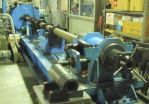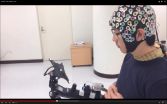Meteorite impacts can create DNA building blocks
2015-08-18
(Press-News.org) A new study shown that meteorite impacts on ancient oceans may have created nucleobases and amino acids. Researchers from Tohoku University, National Institute for Materials Science and Hiroshima University discovered this after conducting impact experiments simulating a meteorite hitting an ancient ocean (Fig. 1).
With precise analysis of the products recovered after impacts, the team found the formation of nucleobases and amino acids from inorganic compounds. The research is reported this week in the journal Earth and Planetary Science Letters.
All the genetic information of modern life is stored in DNA as sequences of nucleobases. However, formation of nucleobases from inorganic compounds available on prebiotic Earth had been considered to be difficult.
In 2009, this team reported the formation of the simplest amino acid, glycine, by simulating meteorite impacts. This time, they replaced the carbon source with bicarbonate and conducted hypervelocity impact experiments at 1 km/s using a single stage propellant gun (Figure 2).
They found the formation of a far larger variety of life's building blocks, including two kinds of nucleobases and nine kinds of proteinogenic amino acids. The results suggest a new route for how genetic molecules may have first formed on Earth.
INFORMATION:
Publication Details
Title: Nucleobases and amino acids formation through impacts of meteorites on the early ocean.
Authors: Furukawa Y., Nakazawa H., Sekine T., Kobayashi T., Kakegawa T.
Journal: Earth and Planetary Science Letters (2015), http://dx.doi.org/10.1016/j.epsl.20015.07.049
Contacts:
Dr. Yoshihiro Furukawa
Assistant Professor, Department of Earth Science, Tohoku University
Email: furukawa@m.tohoku.ac.jp
Tel: +81-22-795-3453
Dr. Takamichi Koybayashi
Principal Researcher, Ultra-High Pressure Processes Group
Materials Processing Unit, National Institute for Materials Science
Email: KOBAYASHI.Takamichi@nims.go.jp
Tel: +81-29-860-4419
Dr. Toshimori Sekine
Professor, Department of Earth and Planetary System Science, Hiroshima University
Email: toshimori-sekine@hiroshima-u.ac.jp
Tel: +81-82-424-7474
[Attachments] See images for this press release:


ELSE PRESS RELEASES FROM THIS DATE:
2015-08-18
Children with better academic and behavioral functioning when they start kindergarten often have better educational and societal opportunities as they grow up. For instance, children entering kindergarten with higher reading and math achievement are more likely to go to college, own homes, be married, and live in higher-income neighborhoods as adults. Now a new study points to very early roots of differences in school readiness, with growth in vocabulary playing a particularly important role. The study found that children with larger oral vocabularies by age 2 arrived at ...
2015-08-18
Adolescents who have romantic relationships tend to have more problems with psychosocial adjustment. In contrast, young adults who have romantic relationships tend to have fewer problems with psychosocial adjustment. Although the links between having a romantic relationship and psychosocial adjustment change with age, a new longitudinal study has found that it's not just having a relationship that matters, but the quality of the relationship: Higher-quality romantic relationships are associated with fewer psychosocial difficulties across adolescence and young adulthood.
The ...
2015-08-18
Scientists working at Korea University, Korea, and TU Berlin, Germany have developed a brain-computer control interface for a lower limb exoskeleton by decoding specific signals from within the user's brain.
Using an electroencephalogram (EEG) cap, the system allows users to move forwards, turn left and right, sit and stand simply by staring at one of five flickering light emitting diodes (LEDs).
The results are published today (Tuesday 18th August) in the Journal of Neural Engineering.
Each of the five LEDs flickers at a different frequency, and when the user focusses ...
2015-08-18
A new test for offers the possibility of near real time monitoring of bone diseases, such as osteoporosis and multiple myeloma. The functionality of the test, which measures changes in calcium isotope ratios, has been validated on blood samples from NASA space shuttle astronauts.
Our bones are largely built of calcium, and the turnover of calcium can indicate the development of bone diseases such as osteoporosis and the cancer multiple myeloma. Geochemists have developed extremely accurate ways of measuring calcium isotope ratios, for example for the study of sea shell ...
2015-08-18
For an embargoed PDF, please contact Cara Graeff or 215-351-2513 or Angela Collom or 215-351-2514.
1. Anonymous essay exposes scandalous doctor behavior
Free abstract: http://www.annals.org/article.aspx?doi=10.7326/M14-2168
Editorial: http://www.annals.org/article.aspx?doi=10.7326/M15-1144
URLs go live when embargo lifts
An anonymous and provocative essay published in Annals of Internal Medicine exposes the dark underbelly of medicine where doctors displayed stomach-churning disrespect for vulnerable patients. The author describes teaching a medical humanities ...
2015-08-18
PHILADELPHIA - Websites for national and state health insurance marketplaces show evidence of improved efforts to assist patients in choosing health insurance plans, such as providing decision support tools, experts from the Perelman School of Medicine at the University of Pennsylvania have found. However, in a letter published in the August 18 issue the Annals of Internal Medicine, the Penn team recommends taking more steps to better support consumers in making informed health plan decisions.
The marketplaces, also called health exchanges, were established by the Patient ...
2015-08-17
Research has shown that a regular dose of aspirin reduces the long-term risk of cancer in those who are overweight in an international study of people with a family history of the disease.
The study, conducted by researchers at Newcastle University and the University of Leeds, UK, is published today in the Journal of Clinical Oncology.
They found that being overweight more than doubles the risk of bowel cancer in people with Lynch Syndrome, an inherited genetic disorder which affects genes responsible for detecting and repairing damage in the DNA. Around half of these ...
2015-08-17
Testing for genetic risk factors could improve treatment for myeloma - a cancer of the blood and bone marrow - by helping doctors identify patients at risk of developing more aggressive disease.
New research, published in the Journal of Clinical Oncology today (Monday), found as few as nine genetic features would need to be tested to identify high-risk patients who might benefit from intensive treatment.
The study, led by researchers at The Institute of Cancer Research, London, is the first to link genetic mutations in myeloma cells to the chances of surviving the disease.
The ...
2015-08-17
Drinking caffeinated coffee daily significantly reduced cancer recurrence and death in stage III colon cancer.
Greatest benefits were in those drinking four or more cups a day.
Researchers are not recommending people drink more coffee pending further studies.
BOSTON - Regular consumption of caffeinated coffee may help prevent the return of colon cancer after treatment and improve the chances of a cure, according to a new, large study from Dana-Farber Cancer Institute that reported this striking association for the first time.
The patients, all of them treated ...
2015-08-17
CLEVELAND - A first-of-its-kind study published in the Journal of Clinical Oncology finds that music therapy lessened anxiety for women undergoing surgical breast biopsies for cancer diagnosis and treatment. The two-year study out of University Hospitals Seidman Cancer Center involved 207 patients.
"To the best of our knowledge, this is the first randomized controlled trial to test music therapy for anxiety management with women undergoing outpatient breast cancer surgery, and the largest study of its kind to use live music therapy in the surgical arena," said lead ...
LAST 30 PRESS RELEASES:
[Press-News.org] Meteorite impacts can create DNA building blocks



